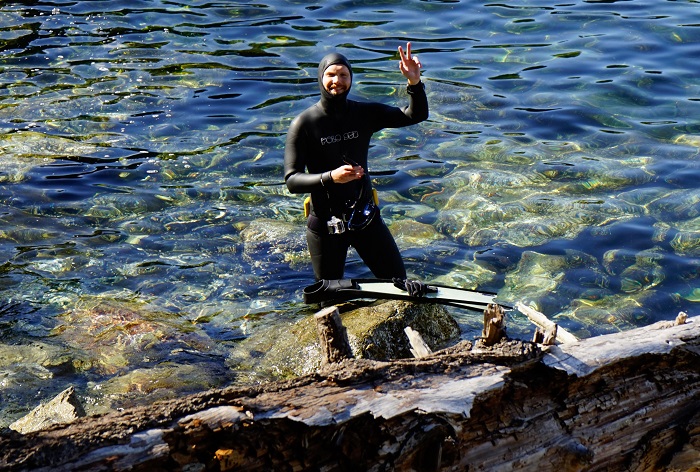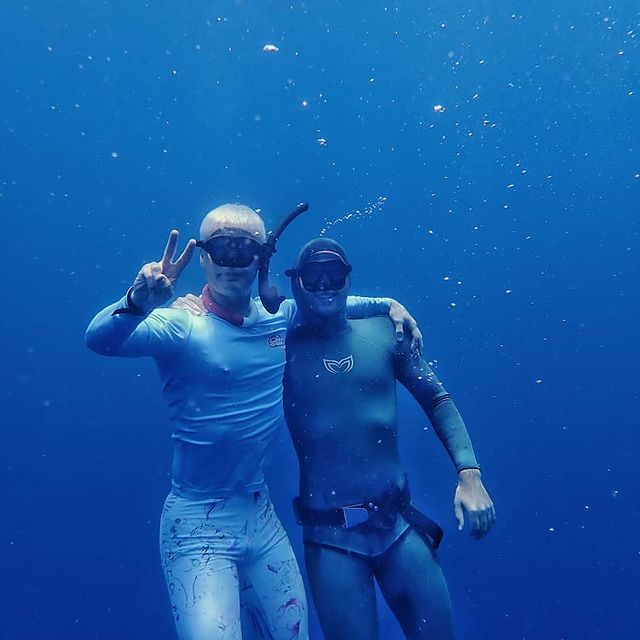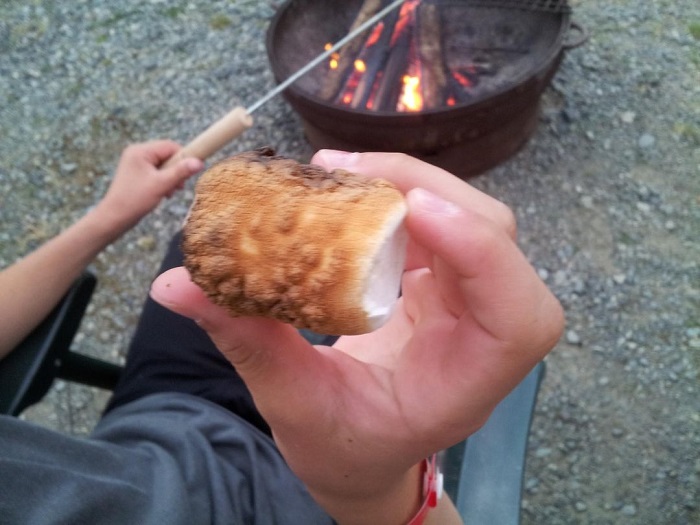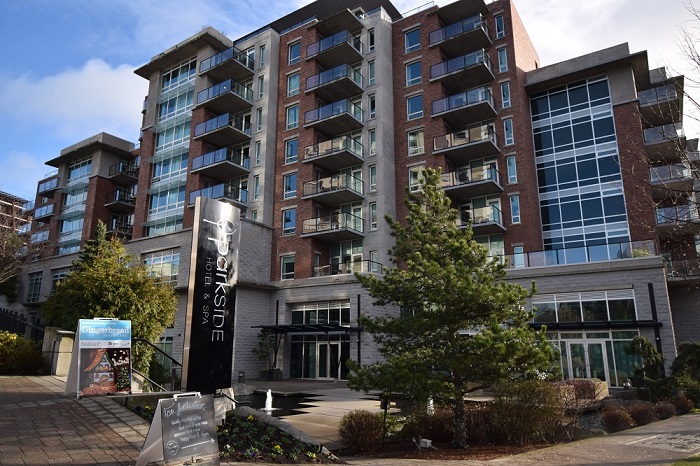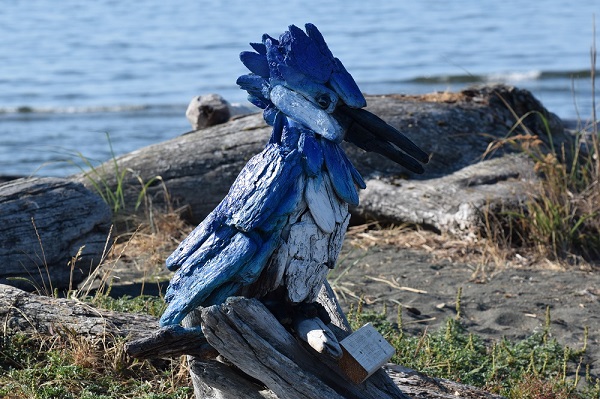- Victoria
- Water Adventure
- Snorkeling & Freediving
Freediving and Snorkeling in Victoria and Southern Vancouver Island
Did you know that snorkeling in Victoria is so rich with sea life that Jacques Cousteau once referred to the West Coast of BC as one of his favourite places in the world to dive!
Mark Cantwell@pacificritters
Disclaimer: I receive a small commission from some of the links on this page.
Just below the surface of Vancouver Island’s coastline is an amazingly diverse world of ocean life that is easily observable by snorkeling. And while snorkeling is an exponentially growing pastime among Island residents, many are also making the plunge to new depths by learning freediving.
Freediving is the act of holding one’s breath and submerging rather than using SCUBA gear. From ancient civilizations to modern-day enthusiasts, the allure of exploring the depths with minimal equipment has endured across centuries. With its evolution from a means of survival to a competitive sport and recreational activity, freediving as a sport is enjoying a renaissance as formalized instruction has become much more ubiquitous around the world - including in and around Victoria.
Ancient Origins
The roots of freediving can be traced back thousands of years to coastal communities around the world. Historically, freediving was essential for gathering food, retrieving valuable resources like pearls and sponges and even salvaging sunken treasures. Ancient civilizations such as the Greeks, Egyptians and Polynesians all engaged in various forms of breath-hold diving for sustenance and commerce.
In Greece, skilled divers known as sponge harvesters would descend to remarkable depths using rudimentary equipment, including weighted stones to aid their descent. Similarly, the Ama divers of Japan have practiced freediving for over 2,000 years, diving without breathing apparatus to gather pearls and seafood.
Evolution as a Competitive Sport
Freediving's transition from a necessity to a recreational pursuit and competitive sport began in the early 20th century. In 1913, the first organized freediving competition was held in France, marking the formal emergence of the sport. Throughout the 20th century, freediving competitions gained popularity, with athletes pushing the boundaries of human capability in disciplines such as depth diving and static apnea (holding one's breath for an extended duration).
One of the most significant figures in the modern history of freediving is Jacques Mayol, whose legendary dives and collaboration with filmmaker Luc Besson brought freediving to the forefront of popular consciousness. Mayol's record-breaking dives, including reaching a depth of 100 meters (330 feet) in 1976, inspired a new generation of freedivers and cemented his legacy as a pioneer of the sport.
 Freediver Iain Belcher; Photo Credit: Matt Duvault
Freediver Iain Belcher; Photo Credit: Matt DuvaultModern Freediving
In recent decades, freediving has experienced a resurgence in popularity, driven by advancements in equipment, training techniques, and increased awareness of the sport's benefits. Organizations like AIDA International (Association Internationale pour le Développement de l'Apnée) have established standardized rules and safety protocols, fostering a global community of freedivers and organizing competitions around the world.
Today, freediving encompasses various disciplines, including constant weight, free immersion, and dynamic apnea, each challenging athletes in different ways. The sport continues to push the limits of human performance, with records regularly broken in both depth and breath-hold duration.
What to Wear While Freediving and Snorkeling in Victoria
If you are considering freediving and snorkeling in Victoria, the first thing you must know is that local waters are cold - averaging 10C all year round. So unless you practice Wim Hof (another interesting pastime), you will need a hooded wetsuit, booties, gloves, mask, snorkel and fins – all of which you can find online or at local dive shops for purchase or rental.
But if you’re feeling even more adventurous and want to explore the flora and fauna at greater depths or even spearfish your dinner, then a course is highly recommended.
Instruction
Instruction for snorkeling is available through the local dive shops. Freediving courses are offered through these regional freediving instructors:
- Jillian Rutledge (Apnea Academy certification)
- Roberta Cenedese (AIDA Freediving Master Instructor)
- Chris Adair (Performance Freediving International certification)
- Iain Belcher (Molchanov certification) - Iain offers a half-day package that is suitable for freedivers and snorkelers
Equipment
|
East2West Freediving
|
- 3945 Quadra Street, Victoria, BC
- 250-516-3483
- Rentals: Yes
- Lessons: Yes
- Guided Tours: Yes
- Sales: No
- 105-1790 Island Hwy, Victoria BC
- 250-478-4488
- Rentals: Yes
- Lessons: Yes
- Guided Tours: Yes
- Sales: Yes
Best Spots for Freediving and Snorkeling in Victoria
Pretty much all of Vancouver Island offers excellent diving – much better than areas around the lower mainland of Vancouver where beach access can be difficult, far from the city, and does not offer as much sea life to experience. The best places for freediving and snorkeling in victoria are:
- Clover Point
- Cattle Point
- Ogden Point
- 10 Mile Point
- Saanich Inlet
Weather and Diving Conditions
Freediving and snorkeling in Victoria are weather dependent. Winds need to be light and waves calm (be sure to check BigWaveDave for local water conditions). Currents also have to be light which is why slack tide is the best time to dive. Finally, there is water visibility. While there is great biodiversity in our local waters, visibility is often very poor compared to the tropics. With ocean temperatures fairly constant all year round, winter generally offers better visibility owing to less organic material in the water column, as well as die-off of kelp and sea grasses that offer hiding places for sea life.
What You Might See While Freediving and Snorkeling in Victoria
There are way too many species to list! But check out Mark Cantwell’s Instagram gallery (pacificritters) for examples of the regional biodiversity.
Mark is based in Victoria British Columbia and was finalist for Underwater Photographer of the Year 2020.
He also administers the largest snorkelling community in Canada on Facebook called Vancouver Island Freediving, Snorkelling, and Spearfishing where you can ask questions about dive conditions, equipment, and local sealife.
If it's a different kind of outdoor water adventure you're looking for, I recommend you check out Viator to see what's available near Victoria.
Recent Articles
-
Vancouver Island Wildlife Viewing Times and Locations
Sep 16, 24 06:42 PM
Discover the best times and places to see wildlife in their natural habitat with our Vancouver Island Wildlife Viewing guide. -
Private Campgrounds on Vancouver Island
Aug 13, 24 05:23 PM
Your one-stop listing of all private campgrounds on Vancouver Island. -
Where to Stay in Victoria, BC: A Comprehensive Guide
Jul 10, 24 12:42 PM
Choosing the right place to stay can significantly enhance your experience. This guide provides tips and ideas to help you decide where to stay in Victoria.

